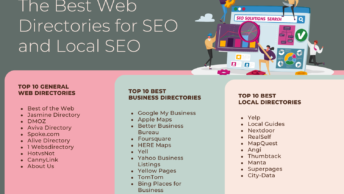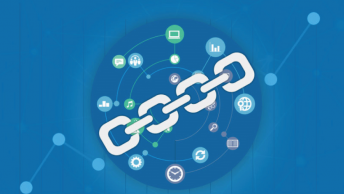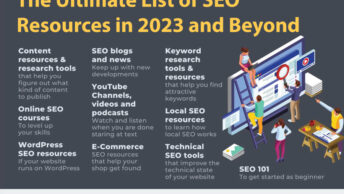There is a good deal of discussion in SEO circles currently about disavowing links. If you are concerned by what you may have read, this article may well put your mind at rest. For most people, it is not necessary to disavow links. In the rare cases where it is, you probably already know you need to do something. Either you have received a notification from Google about questionable links, or you may have noticed a dramatic reduction in the ranking of your web pages in keyword search reports.
To clarify this discussion, it may be helpful to remind ourselves of how we got into this situation.
The Old Wisdom — To Rank Well In Google You Should Get Links
In the early days of search, understanding the Google PageRank algorithm seemed very important since this was at the heart of the Google search process. Backlinks pointing to any given web page were said to be an indicator of the authority and relevance one could attach to that web page. Some links were more important than others but it seemed that all links could make a contribution, however small.
The Mess That Google Created
Given that links pointing to a web page could help boost that web page in search engine rankings, it was only human to add as many backlinks as possible in support of your particular web page. Since Google very quickly pointed out that paid links were against their guidelines, people became very inventive in creating other ways of gaining backlinks.
Google casts its net widely as can be seen from these examples of link schemes which can negatively impact a site’s ranking in search results:
- Buying or selling links that pass PageRank. This includes exchanging money for links, or posts that contain links; exchanging goods or services for links; or sending someone a “free” product in exchange for them writing about it and including a link
- Excessive link exchanging (“Link to me and I’ll link to you”)
- Linking to web spammers or unrelated sites with the intent to manipulate PageRank
- Building partner pages exclusively for the sake of cross-linking
- Using automated programs or services to create links to your site
Your Link Profile
Through your own actions and through the efforts of any SEO consultants you may have used, your website will be associated with a whole network of other web pages with links pointing to your site. This is the so-called link profile for your site. If some of these links would fall under the definition of link schemes, then you may already have seen negative effects in Google searches or may have received a message from Google that some of the backlinks were problematic.
Matt Cutts and his WebSpam team in Google are the policemen as far as detecting unacceptable link schemes go and taking corrective actions. Wherever possible, they rely on algorithmic methods rather than resorting to individual manual actions. However in April 2012, the application of the first Penguin update specifically working on unacceptable link schemes signaled the start of a new era. At that time, Google said this would affect about 3% of all search queries. Further revisions of Penguin have progressively affected the search engine visibility of more and more websites.
Websites that were affected by Penguin saw their search traffic cut considerably and their keyword rankings showed large drops.
If Penguin Caught You, What Do You Do With All Those Links?
If you know you do have a Penguin problem, either from a Google message or from seriously reduced search results then you will need to improve your link profile. Google recommend that you should write to webmasters responsible for unsatisfactory links and ask that they be removed. Here for example is an e-mail message I received requesting the removal of a link which in no way fell under any of the link schemes categories. However the Web master who sent the message clearly wanted to cover all bases.
Subject: Unnatural Link Removal Request
Hi Webmaster,
We would like to discuss an important matter with you regarding your site.
It has come to our attention that Google has penalized our site due to our backlink profile. Unfortunately, a link to our site on your website may be considered unnatural by Google and may be partially responsible for our penalization.
Because of this, we request that you remove the link to our site that is located here and says: …
As you might imagine, it is somewhat unlikely that any large proportion of such links will be removed. Since in some cases thousands of links may be involved, Google now has offered a disavow tool to handle those links which could not be removed by direct contact. Disavowing a link means that Google will treat it as if it had a ref=nofollow tag. In other words it is disregarded in any evaluation of the website.
Some Useful Resources If You Do Decide To Disavow Links
The three following articles provide useful information on the mechanics of disavowing links, if you decide that is what you wish to do.
The first is the official Google Webmaster Tools advice on how to Disavow links. They do require that you’ve done as much work as you can to remove spammy or low-quality links from the web, and are unable to make further progress on getting the links taken down. You can then disavow the remaining links whereby you ask Google not to take certain links into account when assessing your site.
They add an important proviso, which may cause you to have second thoughts:
This is an advanced feature and should only be used with caution. If used incorrectly, this feature can potentially harm your site’s performance in Google’s search results. We recommend that you disavow backlinks only if you believe you have a considerable number of spammy, artificial, or low-quality links pointing to your site, and if you are confident that the links are causing issues for you. In most cases, Google can assess which links to trust without additional guidance, so most normal or typical sites will not need to use this tool.
Danny Sullivan has written a very clear account of How Google’s Disavow Links Tool Can Remove Penalties. Nevertheless it is most important that you have no Misconceptions about Google Search Algorithm Updates and the Disavow Links Tool, which Pratik Dholakiya of Search Engine Journal has written about.
Do You Have A Guilty Secret?
It may be that your link profile is somewhat questionable, but yet there is no indication that Google is aware of this or takes it into account in its search results. Should you keep quiet? Could it be that there are no repercussions down the road.
Is Now The Time To Fess Up?
Recently Matt Cutts has said that there will be a large Penguin update in 2013 that he thinks will be one of the more talked about Google algorithm updates this year. Google’s search quality team is working on a major update to the Penguin algorithm, which Cutts called very significant.
Eric Enge describe this as a Penguin 2.0 Forewarning and is clearly impressed by the recent efforts of Matt Cutts et al.
Another indicator that people are taking Google very seriously on this is that Barry Schwartz, a long-time hold-out against the nofollow tag has now switched and declared My Paid Links Are NoFollow. He is a very well known and respected commentator on the search engines scene. If he believes that it is now important to go with the Google guidelines given its effect on search engine traffic, then who are we to take a different line. This line of argument suggests you promptly start out on the disavowing links process.
But Wait, Does Using The Disavowal Process Affect Your Standing With Google?
The disavowal of Links process and the subsequent reconsideration request to Google when all has been completed gives Google a great deal of direct information on your website structure and the link profile you have created. Could this be used against you in the long run?
Aaron Wall of SEOBook certainly thinks so. As he muses What Types of Sites Will Actually Remove Links? He notes that:
When Google aggregates Webmaster Tools link data from many penalized websites they can easily make 2 lists:
- sites frequently disavowed
- sites with links frequently removed
Would it not make sense for them to downgrade any websites that appear frequently in these lists. By using the disavowal process, we will be contributing data that helps them to do this.
Given the importance of Google search to website traffic, nevertheless any such concerns should not delay action on disavowal. The bottom line on all this is that to an extent you are damned if you do and are damned if you don’t. So accept the inevitable with good grace.






